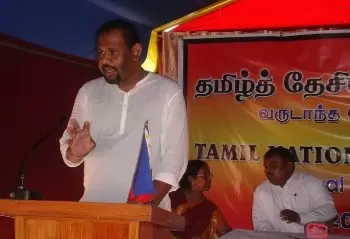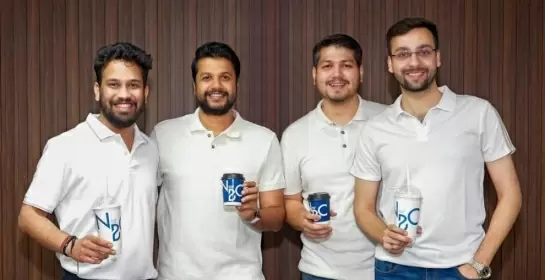‘We reject the 13th amendment and the provincial councils created by it’

19-July-2013
Vol 4 | Issue 29
Gajendrakumar Ponnambalam is a third generation Tamil politician from Sri Lanka. He hails from a family of well known lawyers. His father Kumar Ponnambalam, who championed the cause of Tamils in a racist milieu, was gunned down in Colombo in 2000 by unidentified assailants.
A former Member of Sri Lankan Parliament (2001- 2010) and leader of a political party, the Tamil National Peoples' Front (TNPF), Gajen as he is fondly called, is an articulate, out spoken young politician. He is a qualified lawyer, educated in England.
.webp) |
|
Gajen says India should recognize the Eelam Tamils as a distinct nation
|
Gajen is a marked man now. His call for an internationally backed Transitional Administration in Tamil areas of Sri Lanka, and his fearless crusade for Tamil rights, often taking contrarian positions to that of President Mahinda Rajapaksa, has earned him many enemies.
In May 2013, four unidentified masked men surveyed his house. The obvious message to him is, “back off, or else…”
But the 39-year-old Gajen is not the one to heed to such threats. He gave an exclusive interview to The Weekend Leader, and spoke to Paul Newman on wide ranging issues.
The first part of the interview was carried last week.
Here, we are publishing excerpts from the second part of the interview.
India still feels the 13th amendment (to the Sri Lankan constitution) is the final answer to the Tamil problems and keeps pushing for it. Why are you against it?
The 13th amendment purports to provide devolution within the unitary framework structure of the Sri Lankan State. The term “unitary” has very specific legal connotations under constitutional law.
All legislative and executive powersare vested in one power centre in a unitary state. In other words, the unitary state structure cannot provide for devolution of power.
The 13th amendment only provides the mirage of devolution.
The provincial councils that were created by the 13th amendment are mere appendages to the central government. As several constitutional experts have observed, the relationship between the central government and the provincial council is akin to a principal – agent relationship.
Simply put, thecentral government and the governor appointed by the president ultimately control all the so-called powers that are to be vested in the provincial council.
The provincial council’s elected chief minister and the board of ministers’ official role can at best be described as advisors to the governor, who is appointed by the president. They hold no power.
What is actually happening in Sri Lanka is a systematic genocide of the Tamil nation. That is the conflict between the Tamils and the Sinhala Buddhist State.
As far as Tamils are concerned, the solution lies in not only recognizing Tamil nationhood, but also preventing any future undermining of its existence. Then the question must be asked, given the nature of the 13th amendment, how on earth is it going to be a basis for a solution to the Tamil National question?
The truth is that the 13th amendment and the provincial councils were forced on the Tamils by both India and the Sri Lankan State.
This happened after India managed to use the Tamil liberation struggle as a convenient pressure point to get the then JR Jayawardena government to course correct its shift towards the USA and firmly commit to India’s sphere of influence instead.
This commitment to India by Sri Lanka can be clearly seen in the Letters of Exchange annexed to the Indo – Sri Lanka accord (of 1987).
The quid pro quo of Sri Lanka committing to India’s sphere of influence was that the Tamils were asked to effectively surrender their struggle.
The Tamils, my party and I personally, have repeatedly stated that we are India’s natural allies.
We are not against the provisions in the Indo – Lanka Accord that safeguard India’s national security and strategic interests. What we cannot accept is the part that prescribes a solution to the ethnic conflict in the form of the 13thamendment and the provincial councils.
We have in the past, and we will in the future too, do our utmost to safeguard India’s interests in Sri Lanka. But India must not merely look to safeguard her own interests at our expense. That is just not acceptable.
Do you believe India can play a concrete role in getting justice for the Tamils? If so what do you expect India to do?
Of course, India can play a concrete role. I would go further and say that India must play a concrete role. But that role cannot be played in a constructive and honest manner as long as India only seeks to safeguard its interests in Sri Lanka.
As starting point, India should recognize the Eelam Tamils as a distinct nation with our own sovereignty and right to self-determination. India must urge the Sinhala nation to negotiate with the Tamils to arrive at a solution that re-envisions Sri Lanka into a new plurinational state that is mutually beneficial for both nations.
But as a matter of urgency though, India must play the key role in setting up a Transitional Administration in the North – East of Sri Lanka.
Given the animosity between the Tamils and the Muslims who live in the north and east, how do you propose to work with them in future?
I cannot agree with the view that there is animosity between the Tamils and the Muslims in the North and East.
There have been unfortunate mistakes made by the Tamils (against Muslims). The Tamils have unreservedly apologized for those mistakes.
We are keen to make sure they are never repeated. As far as the TNPF is concerned, the North-East is as much the homeland of the Muslims as it is for the Tamils. There can be no questions about it.
My party however refuses to speak on behalf of the Muslim people. They don’t like us to speak for them, as if we have a common identity. I think the Tamils must respect their feeling and accept whatever identity they choose for themselves.
We are committed to working out a framework for the North-East that the Muslims and Tamils will feel mutually comfortable and secure with. I have no doubts that such an arrangement can be arrived at.
 |
|
Tamils and Muslims can live in peaceful coexistenc, according to the TNPF leader
|
How do you view the attacks on Muslims by the BoduBalaSena?
The attacks on the Muslims by the BoduBalaSena are deplorable without reservation. But quite honestly, the TNPF has been saying this (such attacks) would happen for sometime now.
What the Muslims must understand is that in the Sinhala-Buddhist-Nationalist scheme of things, the Tamils were the No.1 targets.
Now that they believe the Tamils have been sufficiently dealt with, they are going after the next obvious hurdle to their vision of a Sinhala Buddhist Ethnocracy, the Muslims.
Is your party contesting the forthcoming provincial elections in the north? If so,do you plan to go alone or strike an alliance with TNA? Do you believe these elections will be free and fair?
We completely reject the 13th amendment and the provincial councils that were created by it. We will have nothing to do with these elections.
Do you believe any Sinhala regime will give justice to the Tamils?
Not unless the international community intervenes in a meaningful and effective manner. And for that to happen, the Tamils the world over need to mobilize in a well coordinated and strategic way.
What are the future plans of TNPF?
Our vision is to transform the TNPF into a people’s movement. It is a tough task given the conditions that prevail in the homeland.
But this is where we see Tamil Nadu’s students’ movement and the Diaspora mobilization as key. We take great inspiration from them. The people here will follow provided we can give honest leadership.
Lastly, what are the memories you have of the Black July (the anti-Tamil pogrom of July 1983 in Sri Lanka that claimed the lives of hundreds of Tamils) and how it shaped the political course of your father and now you?
Well I was 9 years old when Black July’83 happened. My family didn’t flee Sri Lanka like many Tamils did.
Instead we were fortunate to find protection amongst Sinhalese friends of my father. We would move from house to house as most Sinhalese families were too frightened to shelter us beyond a couple of days.
The truth is that Black July itself didn’t have too much of an impact on me. I was sheltered by my parents from seeing the genocidal destruction to life and property of the Tamil people. But it was my overall experience as a Tamil that shaped my views. There is no single event that I can point to and say “this is what convinced me!”
Many people think that my political views were shaped as a result of the assassination of my father. But that is not true.
My views had been formed much earlier. My father’s assassination merely served to reinforce the correctness of my views about Sinhala Buddhist Nationalism and its genocidal agenda.
Dr. Paul Newman holds a Doctorate of Philosophy on ‘Internal Displacement and Human Rights situation in Northern Sri Lanka’ from Bangalore University. He was one of the four public speakers at the Permanent People’s Tribunal on War Crimes against Sri Lanka














